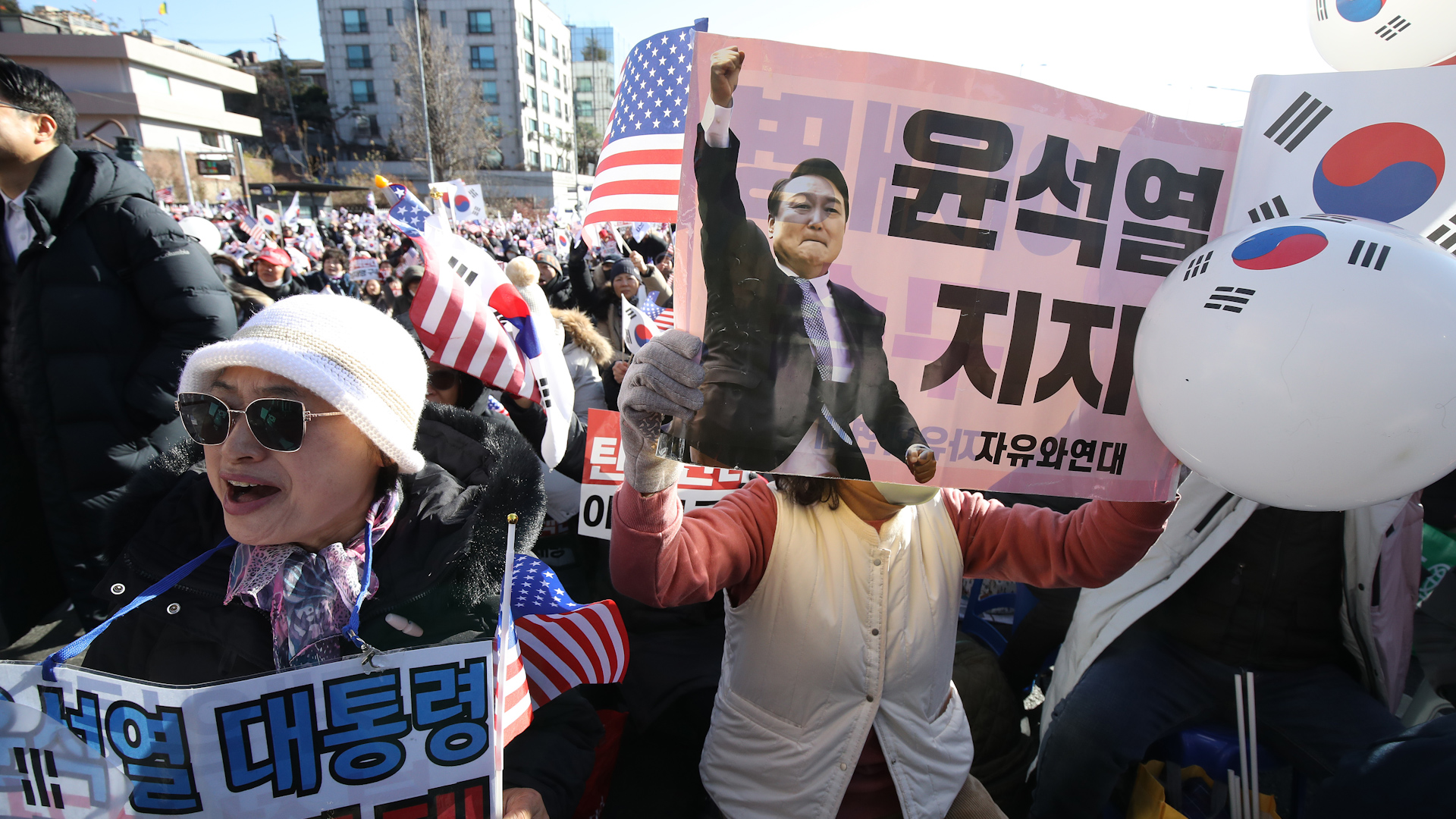
Yoon impeachment crisis: Investigators push to enforce arrest warrants
By Ryan Robertson (Anchor), William Jackson (Producer), Ian Kennedy (Lead Video Editor)
South Korea faces an unprecedented political crisis as investigators work against a midnight deadline to detain impeached President Yoon Suk Yeol. Yoon remains in his official residence in Seoul, shielded by the Presidential Security Service, which has repeatedly blocked attempts to enforce arrest and search warrants issued by the Seoul Western District Court.
Media Landscape
See how news outlets across the political spectrum are covering this story. Learn moreBias Distribution
Left
Untracked Bias
The warrants stem from Yoon’s declaration of martial law on Dec. 3, a brief but controversial move that led to his impeachment on Dec. 14.

Download the SAN app today to stay up-to-date with Unbiased. Straight Facts™.
Point phone camera here
The anti-corruption agency, or the Corruption Investigation Office for High-ranking Officials, coordinating with police and military authorities, is leading efforts to execute the warrants. During the week of Dec. 30, an attempt to detain Yoon failed after security forces denied investigators access and reinforced the residence with barbed wire.
Officials are now considering the possibility of arresting members of the security team for obstruction of justice. The use of special task forces has also been raised as a potential option.
Yoon’s legal team argued that the warrants cannot be enforced at his residence, citing laws that protect locations tied to military secrets. They also claim the anti-corruption agency lacks jurisdiction over insurrection charges, and accuse investigators of exceeding their authority. Complaints have been filed against agency officials, police and military personnel involved in the detention attempt.
Although martial law lasted just hours, its declaration has left South Korea deeply divided. Critics accuse Yoon of attempting an unconstitutional power grab to sideline opposition lawmakers, while supporters argue the action was necessary to maintain order.
Get up to speed on the stories leading the day every weekday morning. Sign up for the newsletter today!
Learn more about our emails. Unsubscribe anytime.
By entering your email, you agree to the Terms & Conditions and acknowledge the Privacy Policy.
The crisis drew both domestic and international scrutiny, raising concerns about the stability of South Korea’s democracy and its global reputation. Martial law declarations are rare in South Korea’s modern history and evoke memories of authoritarian regimes.
The Constitutional Court is deliberating whether to formally remove Yoon from office or reinstate him. If Yoon is detained, it would mark the first time a sitting president in South Korea has been arrested, setting a significant precedent with potential lasting impacts on the nation’s political future and democratic institutions.
[Ryan Robertson]
SOUTH KOREA IS FACING AN UNPRECEDENTED POLITICAL CRISIS. INVESTIGATORS ARE WORKING AGAINST A MIDNIGHT DEADLINE TO DETAIN IMPEACHED PRESIDENT YOON SUK YEOL.
YOON IS HOLED UP IN HIS OFFICIAL SEOUL RESIDENCE, SHIELDED BY THE PRESIDENTIAL SECURITY SERVICE, WHICH REPEATEDLY BLOCKED ARREST ATTEMPTS AND SEARCH WARRANTS ISSUED BY THE SEOUL WESTERN DISTRICT COURT. THE WARRANTS WERE ISSUED AFTER YOON BRIEFLY DECLARED MARTIAL LAW ON DECEMBER 3, WHICH LED TO HIS IMPEACHMENT ON DECEMBER 14.
THE ANTI-CORRUPTION AGENCY, IS COORDINATING WITH POLICE AND MILITARY AUTHORITIES, TO TRY AND ENFORCE THE WARRANTS.
LAST WEEK, AN EFFORT TO DETAIN YOON WAS THWARTED WHEN SECURITY FORCES AT THE RESIDENCE DENIED ACCESS AND THEN REINFORCED THE PREMISES WITH BARBED WIRE. OFFICIALS ARE CONSIDERING ARRESTING MEMBERS OF THE SECURITY TEAM FOR OBSTRUCTING JUSTICE AND MAY DEPLOY SPECIAL TASK FORCES IF NEEDED.
YOON’S LAWYERS ARGUE THE WARRANTS CANNOT BE ENFORCED AT HIS RESIDENCE DUE TO LAWS PROTECTING LOCATIONS LINKED TO MILITARY SECRETS. THEY ALSO CONTEND THE ANTI-CORRUPTION AGENCY LACKS JURISDICTION OVER INSURRECTION CHARGES AND ACCUSE INVESTIGATORS OF OVERSTEPPING THEIR AUTHORITY. COMPLAINTS WERE FILED AGAINST AGENCY OFFICIALS, POLICE, AND MILITARY PERSONNEL INVOLVED IN THE DETENTION ATTEMPT.
ALTHOUGH MARTIAL LAW LASTED JUST A MATTER OF HOURS, ITS DECLARATION LEFT SOUTH KOREA DEEPLY DIVIDED. CRITICS ACCUSE YOON OF STAGING AN UNCONSTITUTIONAL POWER GRAB TO BYPASS OPPOSITION LAWMAKERS. SUPPORTERS CLAIM THE MOVE WAS NECESSARY TO MAINTAIN ORDER. THIS CRISIS IS OF COURSE DRAWING BOTH DOMESTIC AND INTERNATIONAL SCRUTINY…ANDRAISING CONCERNS ABOUT THE STABILITY OF SOUTH KOREA’S DEMOCRACY AND ITS REPUTATION ON THE GLOBAL STAGE.
MARTIAL LAW DECLARATIONS ARE RARE IN SOUTH KOREA’S MODERN HISTORY, AND EVOKES MEMORIES OF AUTHORITARIAN REGIMES. THE CONSTITUTIONAL COURT IS DELIBERATING WHETHER TO REMOVE YOON FROM OFFICE OR REINSTATE HIM.
IF HE IS DETAINED, IT WOULD BE A FIRST FOR A SITTING SITTING PRESIDENT IN SOUTH KOREA—A PRECEDENT THAT COULD HAVE LASTING IMPLICATIONS FOR THE NATION’S POLITICAL FUTURE AND DEMOCRATIC INSTITUTIONS.
FOR MORE OF OUR UNBIASED, STRAIGHT FACT REPORTING – DOWNLOAD THE STRAIGHT ARROW NEWS APP TODAY, OR LOG ON TO SAN.COM.
Media Landscape
See how news outlets across the political spectrum are covering this story. Learn moreBias Distribution
Left
Untracked Bias
Straight to your inbox.
By entering your email, you agree to the Terms & Conditions and acknowledge the Privacy Policy.
MOST POPULAR
-
 Getty Images
Getty Images
Democrats in Congress receive lowest approval rating in Quinnipiac poll history
Watch 2:5910 hrs ago -
 Getty Images
Getty Images
AG Bondi reviewing Epstein documents for release, could hold client list
Watch 1:4810 hrs ago -
 Getty Images
Getty Images
Speaker Johnson won’t support DOGE stimulus checks
Watch 2:0611 hrs ago -
 Reuters
Reuters
UN chief reveals his plan for peace in Haiti to Caribbean leaders
Watch 2:1513 hrs ago




